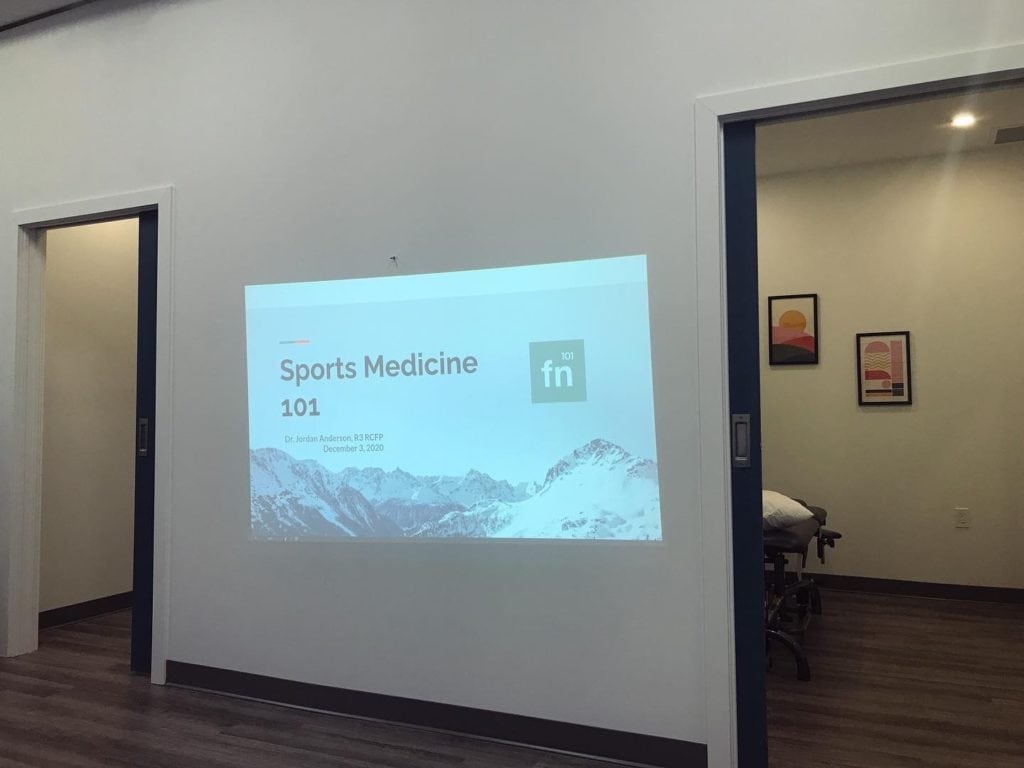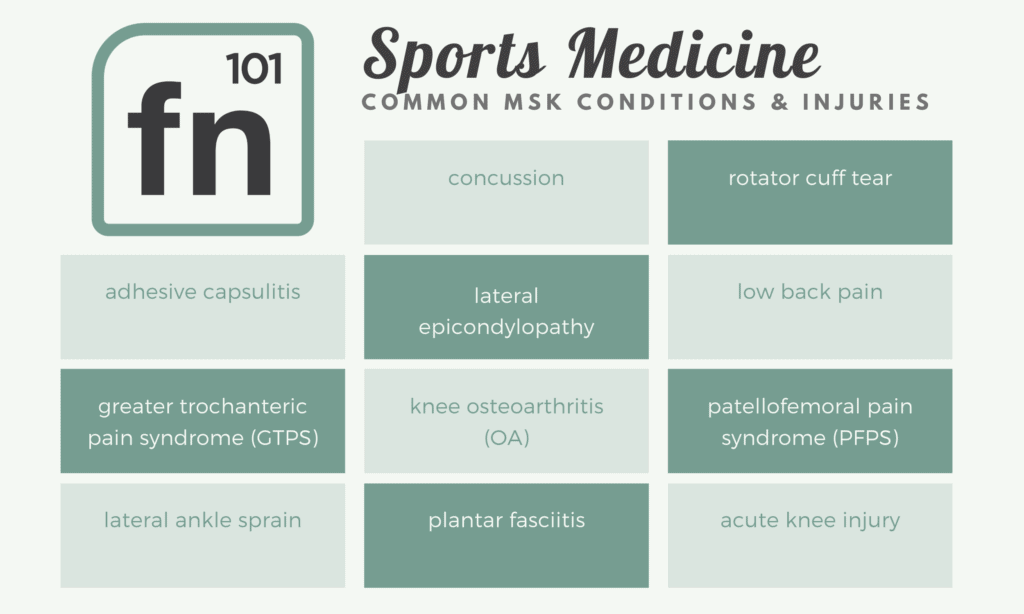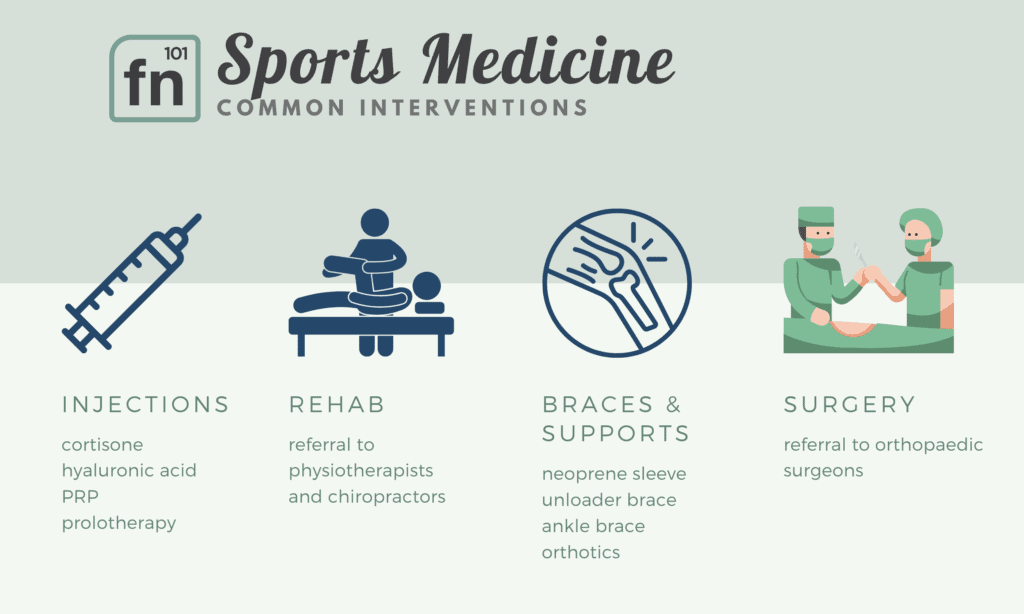We frequently get this question from our patients. This past month we were lucky enough to have a local sports medicine resident, Dr. Jordan Anderson, here at Function101 to educate us on the role of a sports medicine doctor in the treatment pathway for many of the common musculoskeletal (msk) conditions that we treat in the clinic.

what conditions do sports medicine doctors treat?
If you have been diagnosed with any of the following injuries or conditions below you could be a candidate to see a sports medicine doctor. Dr. Anderson works very closely with physiotherapists and chiropractors, in addition to the interventions he does in the clinic.

do I need an MRI before I can see a sports medicine doctor?
No, you do not need an MRI before you can be assessed by a sports medicine doctor. Sports medicine doctors can order advanced imaging when it is indicated, such as x-ray, ultrasound, CT, and MRI. During your assessment with the doctor, they will decide whether further imaging is needed to diagnose your injury or rule out any other conditions. Dr. Anderson shared with us that there are some msk conditions which do not need any further imaging at all, and that oftentimes the imaging does not dictate his treatment approach.
what do sports medicine doctors do during an assessment?
A typical assessment with a sports medicine doctor begins with taking a very detailed history and performing a physical examination. From there, sports medicine doctors play a pivotal role in determining the underlying pathology, including biomechanics, muscles, ligaments, nerves, fractures, and much more.
what are common treatment interventions performed by a sports medicine doctor?

Injections
Cortisone is a powerful anti-inflammatory that can help relieve pain and inflammation in a specific area of your body. The injections usually contain a corticosteroid medication and a local anesthetic. They’re most commonly injected into joints — such as your shoulder, hip, or knee. Dr. Anderson uses cortisone injections as part of his treatment plan to treat plantar fasciitis, knee OA, frozen shoulder, greater trochanteric pain syndrome, rotator cuff tears, and many others.
Platelet-rich plasma (PRP) therapy uses injections of a concentration of a patient’s own platelets to accelerate the healing of injured tendons, ligaments, muscles and joints. In this way, PRP injections use each individual patient’s own healing system to improve musculoskeletal problems. Dr. Anderson uses PRP injections to treat lateral epicondylitis, knee OA, and on occasion for other tendinopathies.
Prolotherapy is an alternative therapy that may help repair body tissues. It’s also known as regenerative injection therapy or proliferation therapy. Prolotherapy involves injecting a solution containing irritants — typically a dextrose solution — into a specific area where damage or injury has occurred. The irritants stimulate the body’s natural healing response, leading to the growth of new tissues. Dr. Anderson uses prolotherapy to treat muscle tears/strains such as at the gluteus medius tendon.
Direct referrals
Sports medicine doctors will often refer on to other health care professionals to co-manage treatment of their patients. These include referrals to conservative therapy such as physiotherapy, chiropractic care, and chiropody, as well as referrals to orthopaedic surgeons for consultation on whether the patient requires surgery or not. Dr. Anderson emphasized the importance of setting realistic expectations when it comes to rehabilitating certain injuries where it can be a long road to recovery. He encourages his patients to do their exercises and stay active!
Braces & Support
Some of the braces/supports that Dr. Anderson may prescribe in practice include: knee braces such as J brace for patellar stabilization or unloader brace for knee OA, orthotics/heel cups for plantar fasciitis, ankle ASO after ankle sprains, among others.
Thank you!
Thank you Dr. Jordan Anderson for taking the time to share your knowledge with us here at Function101 so we can all learn how to work together and get our patients back in action.
We hope you found this blog informative to answer some of the many questions on this topic of sports medicine specialists. If you have any further questions, ask us, we’d love to hear from you!
You can reach us by email at info@function101.ca, or send us a DM on instagram @function101locke.



